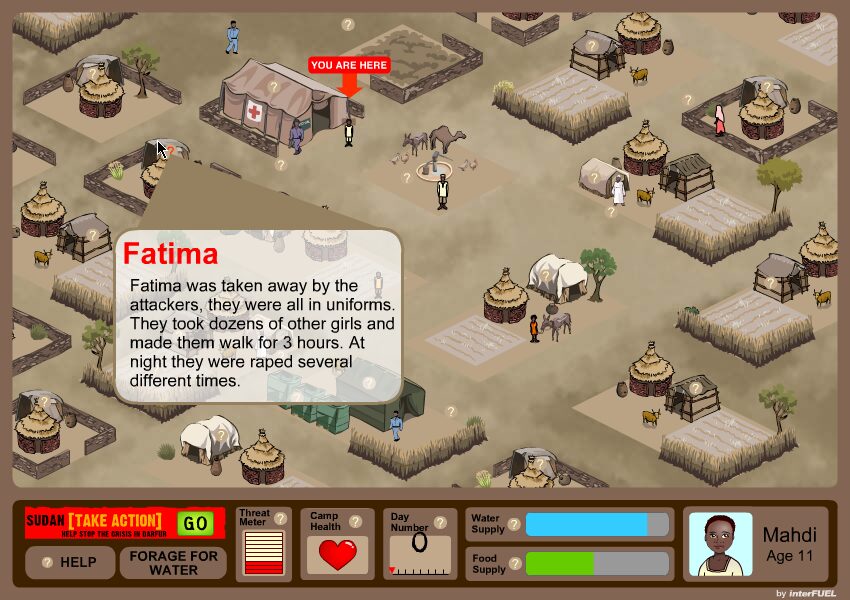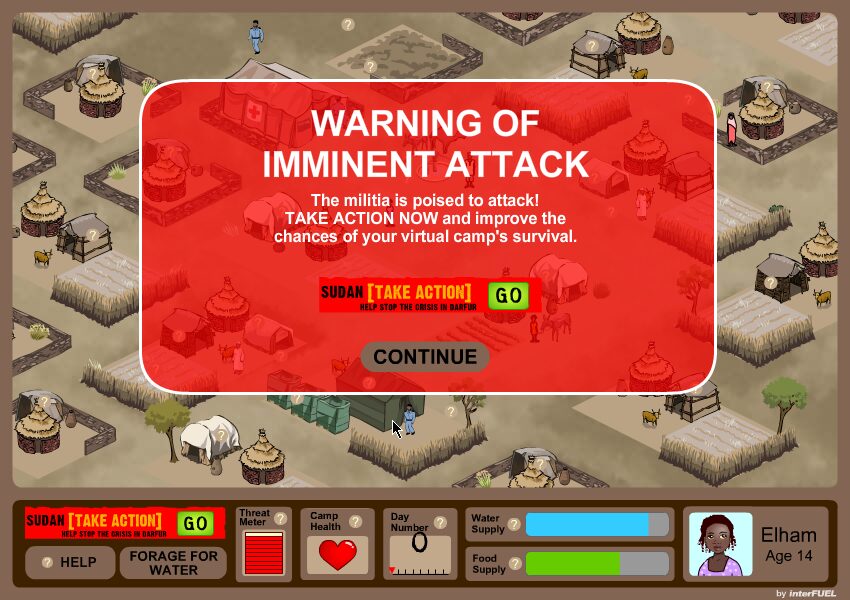Retro Replay Review
Gameplay
Darfur is Dying delivers a unique fusion of survival challenges and resource-management mechanics, structured around two core mini-games. In the first segment, you select one of several refugee avatars and embark on a perilous water-gathering mission across a barren landscape. Dodging militia patrols and relying on quick reflexes to hide behind rocks and trees, you race against time to fill and deliver your dusty water jug before hostile forces can stop you.
(HEY YOU!! We hope you enjoy! We try not to run ads. So basically, this is a very expensive hobby running this site. Please consider joining us for updates, forums, and more. Network w/ us to make some cash or friends while retro gaming, and you can win some free retro games for posting. Okay, carry on 👍)
Successfully returning with water triggers the game’s second mode: camp administration. Here, you allocate your precious resources—water, medicine, and harvested crops—to tend to the health and well-being of your fellow refugees. Constructing bricks to repair shelters and ensuring everyone’s basic needs are met becomes a delicate balancing act, as the camp’s health bar and an ever-climbing threat meter hang in the balance.
The cyclical nature of these mini-games—alternating between high-stress evacuation runs and strategic camp upkeep—creates a compelling tension that mirrors real-life desperation. As days pass and water supplies dwindle, each decision carries weight: will you risk another scouting run for water, or conserve resources and hope the camp stays intact? Your ultimate aim is deceptively simple: survive for one week under these dire conditions.
Graphics
Visually, Darfur is Dying employs a minimalist, Flash-based aesthetic that nonetheless conveys the starkness of its setting. Dusty browns and muted earth tones dominate the palette, evoking the sun-scorched plains of western Sudan. Although the graphics aren’t cutting-edge, the stylized animations and clean iconography serve the game’s message, focusing your attention on urgency rather than technical flair.
Character models are deliberately simplified, allowing you to easily distinguish between refugees, camp structures, and roaming militia. Animations—like the hurried sprint of a water-carrying character or the crumbling of a damaged shelter—are brief but effective, underscoring the fragility of life in this environment. Minor visual flourishes, such as dust trails kicked up during a dash or the flicker of an approaching threat indicator, heighten the sense of tension without overwhelming the player.
While advanced lighting and 3D rendering are absent, the functionally designed interface makes resource levels, threat warnings, and health bars immediately readable. This clarity helps sustain focus on gameplay challenges rather than deciphering complex menus. In a production centered on educational impact, the pared-down visuals complement the narrative, ensuring players absorb the humanitarian themes rather than admire pixel-perfect textures.
Story
At its core, Darfur is Dying is less about a scripted plot and more about conveying the lived realities of displaced Sudanese refugees. You step into the worn shoes of someone whose only goal is daily survival—obtain water, patch up shelters, and keep your community from collapsing under external threats. This barebones narrative approach gives each session an immediacy that resonates emotionally.
Between missions, the game punctuates action with contextual vignettes: brief text blurbs, photographs, and prompts encouraging players to learn more or even get involved with real-world aid organizations. This weaving of factual background into gameplay reminds you that the crisis extends far beyond your browser window. Rather than passive storytelling, the game’s narrative unfolds through your own failures and successes: each broken camp structure or lost supply run feels like a real setback.
Over the course of a simulated week, small narrative beats accumulate—conversations with other refugees, notices of nearby violence, and notifications of dwindling resources. These elements don’t build a traditional hero’s journey but instead offer a mosaic of human resilience: you aren’t vanquishing an ultimate boss, but struggling to keep hope alive against overwhelming odds. That emotional weight lingers long after you exit the game.
Overall Experience
Darfur is Dying stands out as an activist game that prioritizes empathy and education over simple entertainment. You won’t find power-ups or conventional victory screens here; success means maintaining bare-minimum living conditions for as long as possible. This design choice can be both harrowing and eye-opening, prompting reflection on real-world crises that often escape mainstream media coverage.
The replay value rests less on unlocking new features and more on deepening your understanding of humanitarian challenges. Each run through the mini-games reinforces how quickly water supplies can run dry, how capricious external threats are, and how tenuous life in a refugee camp can become. If you approach the game with an open mind, it can spark meaningful conversations or even inspire involvement with relief efforts.
While players seeking flashy visuals or action-packed narratives may find Darfur is Dying sobering and straightforward, its power lies in authenticity and purpose. By framing gameplay around genuine hardship and coupling mechanics with educational prompts, it elevates itself above mere edutainment. For anyone interested in socially conscious gaming or looking to gain perspective on a pressing global issue, this title offers a compact but impactful experience that stays with you long after the final in-game day.
 Retro Replay Retro Replay gaming reviews, news, emulation, geek stuff and more!
Retro Replay Retro Replay gaming reviews, news, emulation, geek stuff and more!








Reviews
There are no reviews yet.